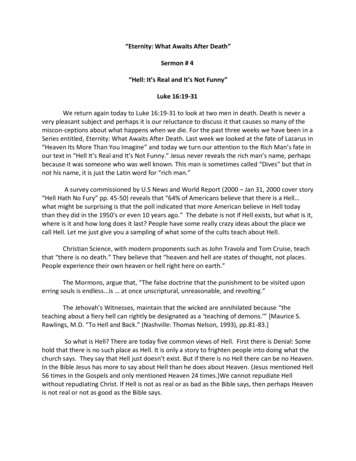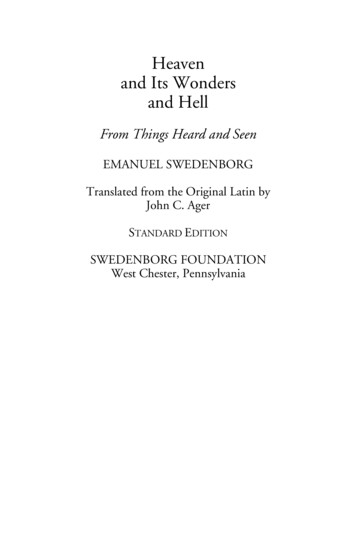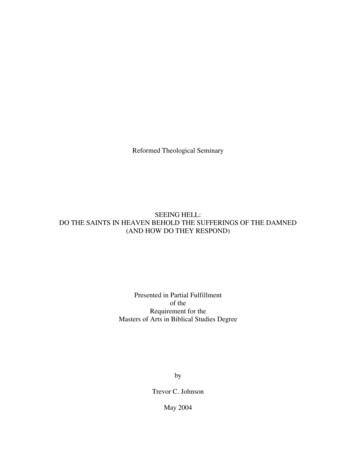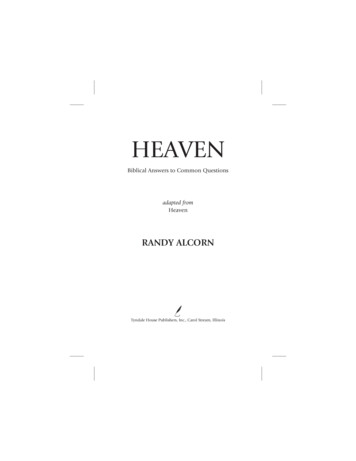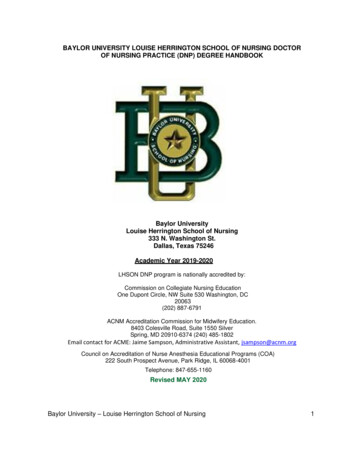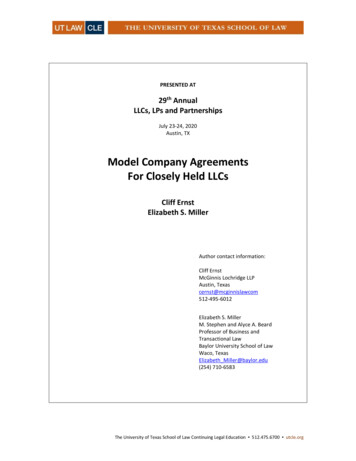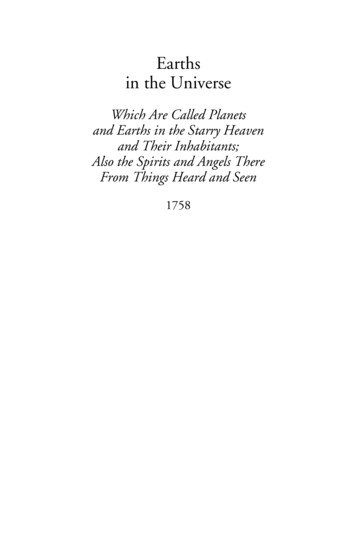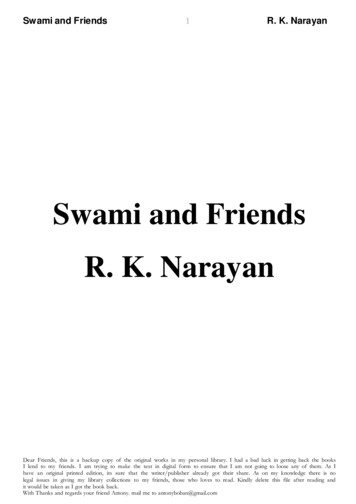
Transcription
Heaven and HellChristian ReflectionA SERIES IN FAITH AND ETHICSBAYLORUNIVERSITY
G E N E R A LE D I T O RRobert B. KruschwitzP R O C L A M A T I O NE D I T O RJoy Jordan-LakeA R TE D I T O RHeidi J. HornikR E V I E WE D I T O RNorman WirzbaW O R S H I PE D I T O RTerry W. YorkP R O D U C T I O NA S S I S T A N TD E S I G N E RP U B L I S H E RT O L L - F R E EJulie BolinEric YarbroughThe Center for Christian Ethics at Baylor UniversityPO Box 97361Waco, TX 76798-7361P H O N E(254) 710-3774( U S A )(866) 298-2325W E B S I T EE - M A I Lwww.ChristianEthics.wsChristian Reflection@baylor.eduAll Scripture is used by permission, all rights reserved, and unless otherwise indicated isfrom New Revised Standard Version Bible, copyright 1989, Division of Christian Educationof the National Council of the Churches of Christ in the United States of America.ISSN 1535-8585Christian Reflection is the ideal resource for discipleship training in the church. Multiplecopies are obtainable for group study at 2.50 per copy. Worship aids and lesson materialsthat enrich personal or group study are available free on the Web site.Christian Reflection is published quarterly by The Center for Christian Ethics at BaylorUniversity. Contributors express their considered opinions in a responsible manner. Theviews expressed are not official views of The Center for Christian Ethics or of BaylorUniversity.The Center expresses its thanks to the individuals, churches, and organizations, includingthe Cooperative Baptist Fellowship, which provided financial support for this publication. 2002 The Center for Christian Ethics at Baylor UniversityAll rights reserved
ContentsIntroduction6Robert B. KruschwitzLiving Under Vacant Skies9A. J. ConyersThe Virtue of Hope18John E. HareUnquenchable Fire24E. Anni JudkinsThe Gates of Hell Shall Not Prevail31Ralph C. WoodMy Maker Was the Primal Love35Douglas V. HenryWhy Stand Gazing?39Julie Pennington-RussellHell is a Bar in Adams-Morgan43Jim SomervilleThe Final Judgment in Christian Art46Heidi J. HornikThe Last Judgment, Michelangelo BuonarottiThe Gates of Hell, Auguste RodinHeaven is My Home53Susan R. GarrettForever Where Our Hope is Born60Terry W. York and C. David BolinHeaven Shall Not Wait62John L. BellWorship Service64David M. Bridgescontinued
Left Behind and Getting Ahead70David Lyle JeffreyNothing But the Truth79A Conversation with Peter J. KreeftSusan Dolan-HendersonThe History of Heaven and Hell84Rikk WattsEcstasy, Symbol, and Rhetoric90F. Matthew Schobert, Jr.Advertisements94Contributors96
Additional ResourcesThese study guides are available by free download from our Web sitewww.ChristianEthics.ws. Each guide integrates Bible study, prayer, worship,and reflection on articles in this issue.LIVINGUNDERVACANTSKIESAs our culture loses the thought of heaven “over us,” how does that shapethe way we live? A world left without a vision of the transcendent is aworld of struggles without victory and of sacrifice without purpose. Tounderstand this is also to understand in a new way the task of the church.THE VIRTUE OF HOPEIf we are to pursue our moral demands seriously, we need a transcendenthope that is not based on human capacity for self-improvement. We havegrounds in our faith for such a hope, both at the individual level and atthe level of society.HEAVEN IS OUR HOMEIs our true home in heaven, and we are merely sojourners on earth? Orare we genuinely citizens of the earth? Where is our true home? The biblical message is that heaven is our true home, but heaven begins here onearth as the Holy Spirit transforms us into a community that manifestslove.UNQUENCHABLEFIREWe have many questions about hell. We can begin to answer these questions by studying the biblical passages about Sheol, Hades, and Gehenna.HELLANDGOD’SLOVEThe universe and our lives ultimately are bounded by God’s unfathomablelove and righteousness. How can we unravel the apparent incongruity between God’s loving character and the existence of hell?THE ART OF THE FINAL JUDGMENTArtists struggle to portray God’s judgment in a spiritually discerning manner. How can their work avoid sinking into a kind of morbid voyeurismand superficial speculation about future calamities?
6Heaven and HellIntroductionB YR O B E R TB .K R U S C H W I T ZCaring deeply about heaven and hell may seem passé,or just too embarrassing, for our popular culture relentlessly twists them into projections of our selfishnessand limitless ambition, into distorted caricatures of theChristian concepts. Yet we should treat these transcendent realities carefully and seriously, for we are deeplyshaped in our moral lives by what we hope for and whatwe fear.We feel a certain ambivalence about the limits to our existence.“There have been times when I think we do not desire heaven,”C. S. Lewis observes in The Problem of Pain, “but more often Ifind myself wondering whether, in our heart of hearts, we have ever desired anything else.”Does caring deeply about heaven and hell seem outdated to us, or isit just too embarrassing? Our wider, ‘approved’ culture says dwelling onthese transcendent realities is passé and encourages us instead to limit ourhopes, and our fears, to things we can have some power over: a more tolerant society, an ever-increasing GNP, a technologically sustainable humanfuture. Despite this, our “Touched By An Angel” popular culture is rampant with fascinating, self-serving forecasts about the boundaries of theworld. We relentlessly twist heaven and hell into projections of our selfishness and limitless ambition, turning our hopes and fears into distortedcaricatures of the Christian concepts. No wonder we are embarrassed toenter the popular fray.As Christians we should treat heaven and hell seriously, for we aredeeply shaped in our moral lives by what we hope for and what we fear.
Introduction7When, in the biblical cosmology, God creates heaven and earth, “heaven” names that part of creation in which God alone exercises dominion,and which we do not know intimately until we are at last fully reconciledto God. If we lose this sense of heaven “over us,” A. J. Conyers worriesin Living Under Vacant Skies (p. 9), it will be more than a change in how wepicture the world in our minds. It will reshape the way we live. We willbecome centered on our own purposes and achievements, forgetting thatthe world is a gift. And we must face our moral struggles without hopethat comes from God’s grace.But will the hope for heaven undermine our moral seriousness? Or,as the saying goes, will it render us “so heavenly-minded that we are noearthly good”? John Hare, in The Virtue of Hope (p. 18), responds that if weare to pursue our moral demands seriously, then we need a transcendenthope that is not based on human capacity for self-improvement. In thevision in Revelation that “God has a name for each one of us, which willbe given to us on a white stone when we enter the next life,” Hare findsa firm ground for our hope. We believe that God already knows, in thatname, the person we can become, and calls us by it.Susan Garrett, Heaven is My Home (p. 53), commends this biblical interpretation of our “heart-hunger:” that heaven is our true home, but heavenbegins here on earth as the Holy Spirit transforms us into a communitythat manifests love.We have many questions about hell: Why does it exist? Who are the‘wicked’ that go there? Is hell itself eternal? Is it a place of everlastingor temporary suffering? To what can we compare hell’s torment? AnniJudkins, Unquenchable Fire (p. 24), shows how we might begin to answerthese questions by studying the biblical passages about Sheol, Hades, andGehenna.The universe and our lives are bounded by God’s unfathomable loveand righteousness. Jesus Christ is Lord and Judge even over hell. RalphWood recounts the ancient doctrine of the harrowing of hell in The Gatesof Hell Shall Not Prevail (p. 31), and Doug Henry, in My Maker Was the PrimalLove (p. 35), explores how even the existence of hell might be an expressionof God’s love.In the powerful opening vision of the book of Revelation, Jesus declares that he holds the keys of Death and of Hades (1:18). Art editorHeidi Hornik examines two powerful artistic expressions of this truth. Forfive centuries Michelangelo’s Last Judgment (p. 46) has confronted powerful leaders of church and state with the thought that we are not the finaljudges of reality, Christ is. Auguste Rodin’s magnificent obsession wasto reveal, through his remarkable sculpture The Gates of Hell (p. 50), thedesperation of souls falling from Grace.Because heaven and hell remain larger realities than we can comprehend, our descriptions of them strain and bump against the limits of human
8Heaven and Helllanguage and imagination. The humor and pathos of our attempts to imagethese realities are explored by Julie Pennington-Russell in Why Stand Gazing? (p. 39) and by Jim Somerville in Hell is a Bar in Adams-Morgan (p. 43).The Left Behind series by LaHaye and Jenkins, with many millions in sales,stands as the most popular attempt to portray the limits of our existence.Not only do these books fail to communicate historic Christian truth, worries David Lyle Jeffrey in Left Behind and Getting Ahead (p. 70), they alsounhealthily feed upon and encourage our insecurities about being “left behind,” both in the measure of God’s judgment and in our culture’s contests.David Bridges leads us, in a service of worship (p. 64), to revere thosedeep things of God which are, in the words of Job, higher than heaven anddeeper than Sheol. His prayers and readings are also suitable for personaland study-group devotion. We offer two recent hymns to enrich our worship. “Toward heav’n, alone, can songs be raised, / toward hell, we canbut cry,” writes Terry York in Forever Where Our Hope is Born (p. 60), withmusic by David Bolin. John Bell, Graham Maule, and the Wild Goose Worship Group of the Iona Community celebrate the arrival of heaven throughJesus’ power and love in our lives in Heaven Shall Not Wait (p. 62). Theother suggested hymns in the worship service appear in several hymnals.Peter Kreeft explains why heaven and hell have figured so prominentlyin his many apologetic writings. Regardless of whether we are addressingour post-Christian culture or answering our children’s hard questions,Kreeft observes in Susan Dolan-Henderson’s interview Nothing But theTruth (p. 79), we owe to them the truth as we know it about the unspeakable bliss and unspeakable misery that frame our existence.In The History of Heaven and Hell (p. 84), Rikk Watts reviews threebooks that not only trace the complex, fascinating story of the notions ofheaven and hell, but also help us understand their relevance in the modernworld.Finally, lest we succumb to the notion that meditation on heaven andhell has led Christians only to a disembodied, otherworldly faith, weshould note its rich influence on Christian art, music, and spirituality. Forin these, reminds Matt Schobert in Ecstasy, Symbol, and Rhetoric (p. 90), wefind “potent expressions of religious faith and theological truth that form,inform, and animate our ethical and moral lives.”
Living Under Vacant Skies9Living Under Vacant SkiesB YA .J .C O N Y E R SLosing a sense of heaven “over us” is more than a shiftin cosmological theory; it has to do with the way we live.A world without a vision of the transcendent is a worldof struggles without victory and of sacrifice without purpose. To understand this is to understand in a new waythe meaning of “gospel” and the task of the church.Occasionally someone calls attention to the incredible gap betweenwhat the church says it believes and what it actually proclaims withany passionate intensity. Early in the last century Scottish theologian John Baillie remarked upon the infrequency of preaching that “dwelton the joys of the heavenly rest with anything like the old ardent love andimpatient longing, or [spoke] of the world that now is as a place of sojournor pilgrimage.”1 More recently, an article on death in The Westminster Dictionary of Christian Theology, matter-of-factly asserts, “neither the mediaevalemphasis on fear of death nor the confident hopes of the early Christiansare much in evidence today.” The writer continues, “Though few . . . explicitly repudiate belief in a future life, the virtual absence of references toit in modern hymns, prayers, and popular apologetic indicates how littlepart it plays in the contemporary Christian consciousness.”2S T. G E O R G E ’ S C H U R C H YA R D — T H E N A N D N O WSuch a change of sentiment came home to me once as my family and Iwere enjoying a tour of Old Dorchester, a long-abandoned colonial villagein South Carolina. We were there along with an assorted crowd of Brownies, Cub Scouts, visitors from out of state, and at least one public schoolteacher—a typical group of Americans—listening to the lecture of a younglocal historian.As we walked among the antique remains of Old Dorchester, the histo-
10Heaven and Hellrian “re-created” the town in our imaginations, taking us out onto the parade grounds and marketplace, where colonial militia met and drilled, andthe merchants, buyers, and craftsmen mingled. The church at the center oftown is now nothing more than a brick tower, forty feet high, in the midstof some woods—the ruins appearing much as they did when they were depicted on the cover of an 1875 issue of Harpers. We followed the historiandown the grassy nave of the church, out into the churchyard, through thearched door still framed by the ancient brick tower. Outside we paused ina circle around a flat tombstone marking the grave of James Postell. Themarble stone bore scars on its rounded edges, testimony of the time Britishsoldiers used it as a chopping block while garrisoned there.The historian pulled a bit of paper out of his pocket. “Imagine,” hesaid, “that we were there when James Postell was buried. As they loweredhim into the ground, these are the words we would have heard from the1768 Book of Common Prayer.” In grave tones, and with expansive gesturesof mock seriousness, he began: “Man that is born of a woman, hath but ashort time to live.” The young man adjusted his wire-rimmed glasses,cleared his throat and went on: “In the midst of life we are in death; ofwhom may we seek for succor, but of Thee, O Lord, who for our sins arejustly displeased?” Waving a hand out to the crowd and holding up the bitof paper in the other, he went on, with thunder in his voice now: “Thouknowest, Lord, the secrets of our hearts; shut not thy merciful ears to ourprayers; but spare us . . . suffer us not at our last hour for many pains ofdeath to fall from thee.”And then he winked.Why did he wink? It was because he knew very well that he shareda secret with us—all of us, whether from Ohio or the Carolinas, or Timbuktu. James Postell (may he rest in peace) would never in this worldunderstand, but we did. The secret that we shared is simply that we nolonger take “otherworldly” sentiments seriously. The brevity of life, thejust judgment of present sinful life, and the fears lest we jeopardize aneternal state in the enjoyment of a temporal existence—all these topics aresimply not a part of common polite, serious conversation. We understandthe wink and the mock seriousness because we sense the world differentlythan did the contemporaries of James Postell.However, we also recognize that this passage from the 1768 Book ofCommon Prayer was a very strong statement; we are somewhat disconcerted by it, even if we don’t know why. Even if we have largely lostthose expressions, we sense that the church once had brought somethingaltogether new into the world with its attitude toward life, death, andresurrection. We are the ones who have turned back to older habits ofthought, as old as humankind. It is these ancient habits of mind and imagination, not our modernity, which are offended. But the very fact that we
Living Under Vacant Skies11almost all agree to be offended (or more often, amused) by these olderexpressions of faith shows how far we have moved from that view of lifeeven in the church.WEDDED BLISS AND THE ETERNAL HOPEContemporary wedding ceremonies illustrate this change as well. Oncea couple from San Antonio, Ben and Cheryl, stood before me to take vowsof holy matrimony. Much earlier we had talked about the ceremony, thestyle and arrangements, and the words. Ben and Cheryl were convincedthat the older ceremonies had much more of a “weighty” and importantsound to them.We looked at the words of the traditional English-language ceremony:Dearly beloved: We are gathered together here in the sight of Godand in the face of this company [for an event that is not to be takenlightly, but entered into] reverently, discreetly, advisedly, and inthe fear of God.We also looked at an “updated” version. The differences, at first, weresubtle and hardly objectionable, except perhaps for the breezier tone:Dear Friends, we are here assembled in the presence of God tounite A (groom’s name) and B (bride’s name) in marriage.The Bible teaches that it is to be a permanent relationship of oneman and one woman freely and totally committed to each otheras companions for life.That last statement is perhaps not too bad, notwithstanding the fact thatmonogamy is actually difficult to establish on purely biblical groundsand that “total commitment” may imply a kind of idolatry that the Biblecertainly does not counsel. Nonetheless, it calls for the exclusive humancommitment of the marriage couple and, in that, it is faithful to the intention of the Bible.What is missing is undoubtedly the spirit of ultimate gravity that surrounds the older version, the feeling that these proceedings are not simplyfor the moment but are anchored in eternity and that something or someone stands in judgment of every earthly event, especially this occasion. Thewedding thereby, on the one hand, is lifted up above the common grind,or else, on the other hand, joins the clutter of our everyday existence, withneither much fear nor much joy to distinguish it.We liked the sound of this next passage:I require and charge you both, as ye will answer in the dreadfulDay of Judgment, when the secrets of all hearts shall be disclosed,that if either of you knows any impediment why ye may not belawfully joined together, ye do now confess it.
12Heaven and HellI have performed a hundred or so weddings in the course of nearly thirtyyears of ministry, and never once have these words ended the ceremony,even though that is what they clearly threaten. But there is something herevery essential to everything that is going on in a wedding: it reminds usall that these words are not just for the moment, but that things spokennow are remembered at the Judgment Seat of God, and that human lifeand decisions loom greater than we ever thought. The fleeting momentis deceptive; these events are anchored in eternity.Now, turning to our modern version, we read the parallel:Marriage is a companionship which involves mutual commitmentand responsibility. You will share alike in the responsibilities andthe joys of life. When companions share a sorrow the sorrow ishalved, and when they share a joy the joy is doubled.The difference between these two statements is the difference between Mt.Sinai and Madison Avenue, or the difference between the “Ancient ofDays” and “Days of Our Lives.” One speaks of immense ancient columnsand steeples, and the other of numerous diplomas hung on the wall behinda psychiatrist’s couch.Another more recent version runs as follows: “I require and charge youboth, as you hope for joy and peace in the marriage state . . . .” The words,notice well, “as you hope for joy and peace in the marriage state” are precisely substituted in this ceremony for the words “as ye will answer inthe dreadful Day of Judgment.” This parallel is extremely interesting. Wewould have to see almost immediately that whoever wrote this paraphrasefound it either more tasteful or more convincing to refer to rewards interms of this life and specifically excised the reference to final judgment.Another difference between the older and the more contemporary versions of the wedding vows regards the relative practicability of the two.In the older version we find vows that are simple, few, and well defined:“Wilt thou have this woman to be thy wedded wife, to live together afterGod’s ordinance, in the holy estate of matrimony?” Turning to the requirements of the newer soul-care version, in contrast, we find them not onlydifficult to define, but probably utterly impossible to keep: “Will you commit yourself to her happiness and self-fulfillment as a person, and to herusefulness in God’s kingdom?” These last words help us to discover thereal paradox of our situation. The more intently we focus on our presentlife (denying, by implication, the transcendent view of life) the more weset ourselves increasingly impossible tasks. A couple can, after all, live together if they have sworn to do so; and the more they feel their obligation,the more likely they will. But to commit oneself to the happiness and selffulfillment of another (for all its this-worldly sound) is probably to setoneself a godlike agenda for life. One can be faithful to a spouse in terms
Living Under Vacant Skies13of sexual fidelity; millions of people have, in spite of the fact that, in this,many have failed. One can stand by a spouse in illness, disappointment,poverty, and grief; millions do it, many of them with admirable courage.And even with the high rate of divorce there are still many more who staymarried “till death us do part.” All of these promises are well within therange of human possibility.But when husbands and wives set for themselves the goal of makingeach other happy, or when one demands of the other that he or she bemade happy by this marriage, then disappointment, resentment, frustration, and anger are almost inevitable. It follows that if one is not happy, heor she might well suspect that something is wrong with the marriage. Afterall, when marriage vows are stripped of their connection with an “eternaldestiny” that has become difficult for modern sentiment to embrace, then itbecomes a quid pro quo contract, a vow given now in view of the happinesspromised in the course of time. Marriage is therefore no longer a promise,the issue of which is really decided in eternity. Instead, it is instituted forthe purpose of making us happy, loved, fulfilled, and significant humanbeings in this present life.HEAVEN AND THE MODERN CHURCHIf the church’s transcendent vision is weakened and diluted, as theseexamples indicate, then what we are seeing here is more than a doctrinalmiscalculation or a temporary neglect that now needs to be addressed. Instead, it is a failure that points toward an essential resistance within thechurch to the very heart of its message.In two fundamental teachings of Christianity, the teaching on creationand the doctrine of reconciliation, we can see why a transcendent vision, acertain longing for heaven, is essential to the life of the church.Creation is a good gift. Inmuch of pagan mythologycreation is somethingwrested out of a primalchaos. The resulting orderwas sometimes good andsometimes tainted with acurse, the curse being experienced in the variousproblems attendant to living in the world. For instance, in early Greek myths about creation, sexuality is seen as a curse; it is a mythic explanation of the problems arisingbecause there are two different sexes in humanity. Zeus blighted humanbeings by dividing them in two, thus weakening their threat to the gods.In other words, the evil that occurs in the world is “in the system.”In the biblical story of creation, God created all things “very good”In the teachings of Christianity on creationand reconciliation we can see why a transcendent vision, a certain longing forheaven, is essential to the life of the church.
14Heaven and Hell(Genesis 1:31). Evil is not explained by creation itself, but by the misuseand disorder of creation in the fall of Adam and Eve. Therefore, everything that has come from God is very good, just as God himself is goodand has every good intention toward his creation. The Fall never entirelydestroys that good; for it is clear that life still centers in that which is givenby God.Now this brings us to the dualism of biblical cosmology. The Bible usually depicts creation as “the heavens and the earth” or “heaven and earth.”In part this refers to thenatural appearance of theThe Bible depicts creation as “heavenheavens (or the sun, moon,and stars—all that is aboveand earth.” “Heaven” refers to the naturalus) and the earth (all thatis below us). But these exappearance of the heavens, but bears morepressions bear more thanthis literal and directthan this literal meaning. It is that part ofmeaning.creation in which God alone exercises domin“Earth” is that part ofcreation that is within ourion, and which we do not know intimatelypower and under humandominion. “Heaven” isuntil we are at last fully reconciled to God.that part of creation inwhich God alone exercisesdominion, and which we do not know intimately until we are at last fullyreconciled to God. Therefore, heaven is the part of creation that we canonly receive, as opposed to that which we partially control, employ, andmanipulate. It is the realm of grace, for it comes entirely as God’s gift andrepresents the fullness of all gifts. Among other things, heaven representsan aspect of reality that we can only know and respond to in terms of adoration; we can in no sense possess it. Therefore our response to things ofthis earth is properly thanksgiving, and our response to the matters ofheaven, praise.This dualism of heaven and earth tells us two important things aboutthe way we relate to creation. The first is that human action is response tocreation, and it does not constitute reality. (We cannot really “become asgods.”) We might imagine that the whole cosmos responds to our wills,but in saner hours we know that is not the case.Even if we affect a small part of the earth, our actions are fraught withall kinds of ambiguity. Our intentional efforts to do a good thing, for instance, always invite the possibility of unintended evil. We work hard toenrich human life and, destroying the environment, threaten the possibility of life itself. We give to the poor and undermine their self-reliance.We make a better product and destroy our neighbors’ livelihood. We are
Living Under Vacant Skies15everywhere faced with the sobering realization that we cannot create theworld, or even re-create it; we can only respond to what God has given.Biblical cosmology relates that fact to us on a cosmic scale. If even thevisible creation stands always somewhat aloof from our exertions to makeit bend to our wills, then how much more does that part of creation whichlies beyond our senses. Creation includes that which responds to the willof God alone. And that is called “heaven.”The second important insight that comes from this realization ofheaven is that the world does not find its purpose in itself. It is, in JürgenMoltmann’s term, “eccentric” because it centers outside of itself; it centersin God and thus finds reality in relationship. This insight applies to morethan cosmology. It applies to everything; all things find their reality inGod, not because they are illusory, but because they are created in relationship. In God “we live and move and have our being” (Acts 17:28).Reality is relationship. John said it this way: “God is love” (1 John 4:8).Salvation comes by grace. Now we can see that a world closed in uponitself and dependent on nothing outside itself (which is, in short, a nontranscendent world), must understand existence altogether differentlyfrom a world believing strongly in a transcendent order. For a world thatis open to the mystery of heaven is, first of all, a world that believes in thepossibility of grace. It is true that the confidence of a non-transcendentworld comes from its self-reliance, but so does its despair. Curiously, aworld that believes it is always subject to the mystery of heaven has less tosay about self-reliance but shows decidedly more confidence. It is a worldpredisposed to expect help.Children instinctively expect grace; so children’s stories often center onthe gift that makes the ugly duckling a swan, the unwanted stepdaughter aprincess, and the department-store Santa turn out to be real. Near disastersturn inside out and prove the triumph of good over evil. J. R. R. Tolkiencalled that fictional device “eucatastrophe,” a good catastrophe. Grace in achild’s story and grace in the real-life triumph over disaster, call forth thesame sentiment, that life is overshadowed by a benevolent mystery.As adults grow in their strength over the world, they lose that sense ofgrace that is so keenly felt by children. Children at first earn nothing andare given everything. Gradually they learn that their environment must bemastered, that elements of life must be earned; at some point it will becalled “making a living.” It’s important for them to learn that lesson, forthat is being “responsible.” It is a response to the gift of life.At the same time it is natural that they should eventually lose sight ofhow much they are dependent on what is simply given, on what they canin no sense earn. They focus on “making a living” and forget that the objectof making a living is life and that life is never earned; it is only given.Jesus said “Unless you change and become like little children, you will
16Heaven and Hellnever enter the kingdom of heaven.” The meaning of these words becomesclear when we see that our immediate (childlike) perception of life as graceis, at every turn, submerged by our growing power over the world. Aschildren we receive the world; as adults our focus narrows to that whichwe have constructed by our own effort. The huge
In The History of Heaven and Hell (p. 84), Rikk Watts reviews three books that not only trace the complex, fascinating story of the notions of heaven and hell, but also help us understand their relevance in the modern world. Fi
